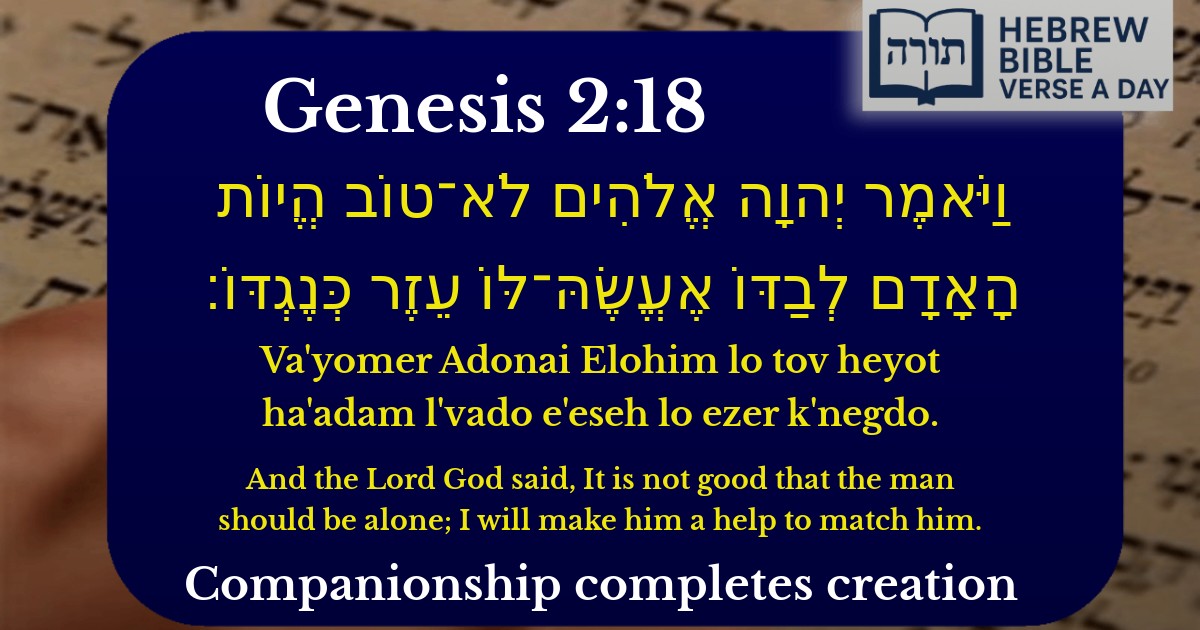Frequently Asked Questions
Q: What does 'It is not good that the man should be alone' mean in Genesis 2:18?
A: This verse teaches that human beings are not meant to live in isolation. According to Rashi, even though Adam had dominion over all creatures, he lacked companionship suited for him. Hashem declared that it was 'not good' for man to be alone, emphasizing the importance of meaningful relationships and partnership in life.
Q: Why did Hashem say 'I will make him a help to match him'?
A: The phrase 'a help to match him' (עֵזֶר כְּנֶגְדּוֹ) means a partner who complements and balances him. The Midrash explains that a spouse is both a helper (עֵזֶר) and sometimes an opposing force (כְּנֶגְדּוֹ), meaning they challenge and refine each other to grow spiritually and emotionally.
Q: How does this verse apply to marriage in Judaism?
A: This verse is the foundation for the Jewish concept of marriage (קידושין). The Rambam (Hilchos Ishus 15:19) teaches that spouses should support and uplift each other, just as Eve was created to be Adam's 'help to match him.' Marriage in Judaism is seen as a sacred partnership for mutual growth in serving Hashem.
Q: What can we learn from 'It is not good for man to be alone' in daily life?
A: The Talmud (Yevamos 62b) derives from this verse that a person without a spouse lives without joy, blessing, and goodness. Beyond marriage, it also teaches the broader Jewish value of community (קהילה)—we are meant to connect with others, support one another, and avoid isolation in both spiritual and practical matters.
Q: Why did Hashem create Eve specifically as Adam's partner?
A: Rashi explains that all other creatures were not fitting companions for Adam—they could not engage with him intellectually or spiritually. Eve was created from Adam’s side (צלע) to show they are equal partners (Genesis 2:22). The Midrash adds that Hashem fashioned Eve with unique qualities to perfectly complement Adam’s mission in the world.


The Need for Companionship
The verse states, "It is not good that the man should be alone" (Bereshit 2:18). Rashi explains that this teaches that solitude is not fitting for humanity, as it leads to a lack of fulfillment and purpose. The Midrash (Bereshit Rabbah 17:2) elaborates that without companionship, Adam lacked the ability to engage in meaningful dialogue, procreation, and mutual support, which are essential aspects of human existence.
The Concept of Ezer Kenegdo
Hashem declares, "I will make him a help to match him" (עֵזֶר כְּנֶגְדּוֹ). The term ezer kenegdo is complex. Rashi interprets it as meaning that if man is worthy, his partner will be a "help" (ezer), but if he is unworthy, she will be "against him" (kenegdo). The Talmud (Yevamot 63a) further explains that a righteous spouse elevates her husband, while an incompatible one may challenge him.
The Purpose of Marriage in Jewish Thought
Rambam (Hilchot Ishut 15:2) emphasizes that marriage is not merely for companionship but for fulfilling the mitzvah of pru u’revu (procreation) and building a home founded on Torah values. The Midrash Tanchuma (Noach 1) adds that a spouse provides emotional and spiritual balance, allowing a person to grow in their divine service.
Divine Intent in Creation
The Sforno comments that Hashem designed humanity for partnership, as solitary existence does not reflect the divine image (tzelem Elokim), which includes the capacity for love, communication, and unity. The Netziv (Ha'amek Davar) adds that this verse sets the foundation for all human relationships, emphasizing that true fulfillment comes through meaningful connection with others.